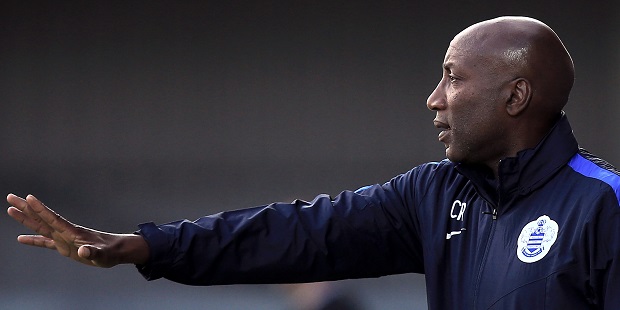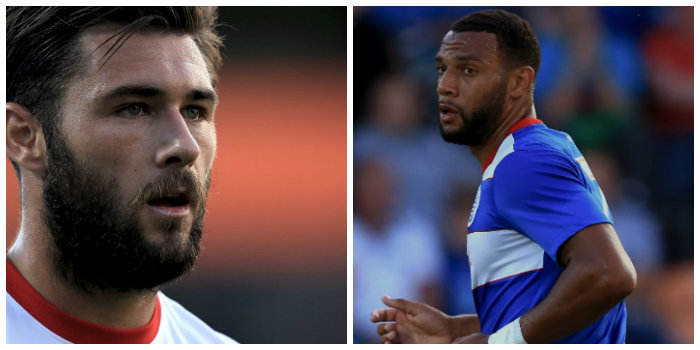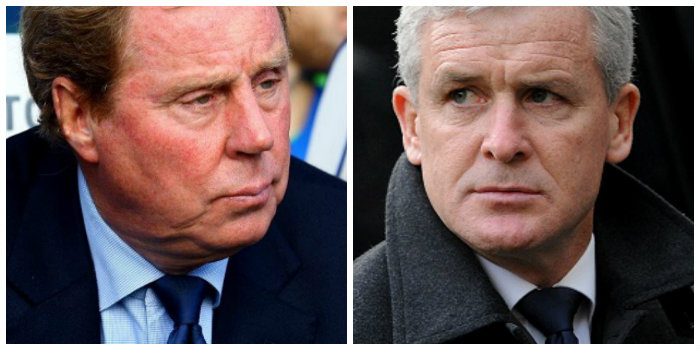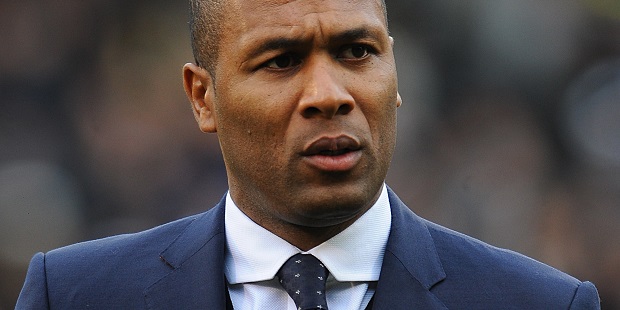Is Ramsey the right man for the job? It depends what the job is

This was always likely to be a difficult season for QPR and it was always likely to be difficult for Chris Ramsey to keep the fans on side.
And after Friday’s debacle at Fulham, it’s clear that many feel they’ve already seen enough.
‘Not the man’. ‘Not the right manager for the job’. Apparently.
The man for what, though? What is the job?
That’s not being facetious. The central issue here is what QPR’s aims are after two expensive, foolhardy and ultimately unsuccessful attempts at the Premier League.
There’s also the wider question of what kind of club QPR is or wants to be; what makes it tick, and how it can succeed going forward. It’s a club with something of an identity crisis.
If, especially given that Charlie Austin and Matt Phillips stayed – an outcome which has undoubtedly undermined the club’s party line to the fans, that this must be a season of consolidation – the aim for Rangers should be promotion or at least to seriously challenge for it, then Ramsey’s position is arguably untenable even at this early stage of the game.

If QPR are looking for a manager to get the best out of an Austin and Phillips-inspired squad, that doesn’t really play to Ramsey’s strengths. So in that case, yes, he probably is the wrong man for the job.
But that’s not the job Ramsey was given.
Brave new world?
With the owners influenced by a change in attitude among the fans, and the realities of Financial Fair Play, the remit became to revert to the QPR of old, to develop youngsters and players from the lower divisions.
In that respect, Ramsey and Les Ferdinand have largely followed the brief.
Out went a number of older players and others would have gone too had it been possible to get rid of them.
In came Massimo Luongo and Ben Gladwin. Both have talent but are far from the finished article, were 22 and came from League One. Gladwin was playing non-League football not long ago.

Grant Hall is 23 and a player Ramsey worked with at Tottenham. His career up to now means, to put it kindly, that QPR’s first team is a step up.
Because Ramsey’s face doesn’t fit, Hall playing well and then being taken out while his stock is high are seen as evidence of the manager’s shortcomings. They could be seen as totally the opposite.
Tjaronn Chery, meanwhile, is new to English football and admits he has some developing to do before he’s ready for the “next step”.
Leaving aside the separate issue of the substitution at Fulham, Chery’s early performances in the most physically demanding of leagues and the manager’s tendency to substitute him, are, again, seen by many as a reason to criticise Ramsey when they could otherwise be seen in a totally different light.
There was also an attempt to bring in Dan Bentley, who is regarded by many good judges as the best young lower-division keeper since Joe Hart, and other players with similar development potential have been and will be targeted.
The desire to build and develop a squad for the long term is there. The club’s existing youngsters have also been involved much more than previously.
This is the job Ramsey and Ferdinand were brought in for. It’s what many fans wanted. And many said they were sick of short-termism and wanted to see something sustainable built.
‘Just a coach – and not a good one’
His face doesn’t fit, so cliches about Ramsey being a coach rather than a manager will always be easy to reach for.
For the actual job he was given – the long-term job many wanted to see carried out – his credentials are sound.
In fact, it’d be tough to find many that are better qualified, given the progress of several players he worked with at Spurs and his experience coaching England’s Under-20 and Under-16 teams. Many in football regularly get jobs on the basis of much less.

It’s just as easy to ignore the progress of the likes of Luongo, Hall and especially Phillips – last season at least – during Ramsey’s short time at QPR and allege that there has been little sign of any coaching ability, despite his reputation.
That’s rubbish. Austin too has improved dramatically in terms of his all-round game in a very short period of time.
But Ramsey’s face doesn’t fit, so his achievements are glossed over.
‘His’ style of play has also been criticised.
This is the Football Manager era where you can simply switch from long ball to passing football and watch your changes in action, and where managers are seen almost as puppet-masters who control players on the pitch.
Teams lacking in confidence and fluency, which can happen for any number of reasons, tend to not be as brave with the ball as managers and fans would like. It’s part of the game.
Ramsey, like his predecessor, favours a passing style – and the club’s signings absolutely reflect that.
But Austin, QPR’s goalscorer and main man, who wasn’t expected to still be at the club at this point, has tended to struggle when the team have tried to play more intricately, although he is improving. That will leave any manager with a dilemma.
Fitting the bill
Important steps have been taken in this respect.
The manager’s face doesn’t fit, so he’s been criticised for the style of play and yet also for signing several midfield players – the key to making the necessary change.
Daniel Tozser, brought in because Ramsey wanted another passing midfielder in addition to Alejandro Faurlin, isn’t fully fit and played earlier than expected because Faurlin picked up an injury.
Ramsey also wanted a ball-playing centre-back – again essential for the style of play many fans say they want. Tim Ream fitted the bill but chose Fulham, so Gabriele Angella was brought in.
That shows consistency and a clear direction when it comes to recruitment, rather than the random nature of Rangers’ previous scattergun approach.
That said, there’s no doubt that collectively Rangers have been poor, especially at the back. That doesn’t reflect well on any coach.
Some might argue that debate over Ramsey’s remit is all well and good, but the minimum requirement has to be at least to have some semblance of effort, cohesion and motivation – all sorely lacking during the horror show at Fulham.
But that kind of disgusting performance isn’t unique to the inexperienced and unglamorous ‘coach not manager’ Ramsey.
It wasn’t uncommon under the most experienced, most showbiz manager of them all, Harry Redknapp.
It happened under Mark Hughes. It also happened under another vastly experienced manager, Neil Warnock, whose team lost 6-0 at Fulham.
Incidentally, those former Rangers managers, and others in recent years, were also reluctant to play 4-4-2, certainly if it involved having Faurlin in a two-man midfield. So what seems to be the most common criticism of Ramsey’s team selections isn’t exclusive to him, either.
So the question has to be asked of those who rage at Ramsey: what are you seeing that you haven’t seen before, even under the most seasoned and proven managers in the land? And what scrap of evidence do you therefore have that yet another change of manager would improve things?

Rangers were a disgrace at Fulham because of a long-standing culture that will take time to change.
And while they are inexperienced and won’t get everything right, Ramsey and Ferdinand probably represent the best, perhaps last, chance for QPR to finally make that change. But it’ll take time and won’t be easy.
There does have to be a question mark over Ramsey’s suitability for the job in the longer term. Of course there does.
Coaching kids and managing Championship footballers are very different and this difficult period will certainly be a test of his man-management skills, that’s for sure.
There is also plenty of room for doubt over whether Ramsey, given his coaching background, is capable of instilling a winning mentality. The signs are not good, but these are still early days.
It may well be that under Ramsey, who was supposed to be rebuilding after a larger exodus than has so far occurred (there’s still the January transfer window to come), QPR don’t do as well this season as they ought to with the players at his disposal.
But Ian Holloway got Rangers up by a squeak at the third attempt, with clubs with much smaller budgets having finished higher.
A couple of years after being tipped for the England job, Redknapp, with a whopping budget, rode his luck in getting Rangers up. At one stage of the season his team were playing abysmally and in danger of missing out on the play-offs.
And of course, QPR spent massively on big-name players, including genuine international stars, yet disgraced themselves in the Premier League.
So we know that having a good squad on paper doesn’t guarantee success, in fact it can be problematic, and that Ramsey won’t be the only Rangers manager to underachieve if he falls short this season.
But his face doesn’t fit, so he has less breathing space.
It’s also worth bearing in mind that the current squad contains a number of players with fitness issues: Faurlin, Leroy Fer and Sandro to name three. It’s not as if all the big names in Ramsey’s squad can be counted on to play 40-plus games.
Someone else might well fare better. Two of Ramsey’s most recent predecessors have done so – in a short-term sense at least.
But where would Rangers be going as a club if that were to happen a third time?
The alternative way
What kind of players would join a newly promoted club with mega-rich owners but a lower-division set-up, a failing youth system and a modest – to put it mildly – training ground?
That question has surely now been answered. Not once but twice.
The alternative might mean QPR finish mid-table this season, possibly lower.
There might be some dismal results and performances, and times when Ramsey, who won’t be persuaded to change his public persona for the sake of his image among fans, looks like he hasn’t a clue what he’s doing, and his players as if they don’t want to play for him.
But Luongo and others would be a year older and a season wiser. Other players of a similar ilk might be brought in to join them, and next season Rangers might finish in the top eight, perhaps in with a shout for the play-offs.
Beyond then, they might strengthen further, with several players continuing to develop, and seriously push for promotion.

During that time, the club might also restore its battered reputation, finally make some meaningful progress in terms of a new training ground, an academy that produces, and so on.
In other words, Rangers might become better equipped to compete in the Premier League.
There are a few mights there. Those aren’t predictions – things could turn out nothing like that.
Rangers might fail – but they’ve been failing anyway.
They might waste time and money, underachieve with the players they have, not deliver on promises to fans, and look foolish – but they’ve been doing that anyway.
They might get a vastly experienced, highly-regarded manager with a cracking CV – but they’ve done that more than once already.
Has the time not now come to draw a line in the sand?
There’s always been an alternative. One that was of little interest to many fans amid the understandable euphoria and expectation of having super-rich owners, for whom a well run medium-sized club was of limited appeal until they ended up with a badly run small club.
The harmful actions of those owners, craving popularity, have often been a direct response to exactly the kind of strength of feeling expressed against Ramsey this week; when spending, hiring and firing. And when churning out endless empty rhetoric.
It’s why Tony Fernandes has enjoyed hero status and then, when it’s all gone wrong, been able to argue that no-one was disagreeing at the time.
That way has been disastrous.
So, what’s to be lost from at least trying the alternative way for a year or two and just seeing what happens? It’s surely worth a go.

02/10/2015 @ 12:36 pm
Finally a decent article!
It’s so common that fans are spoiled, not just QPR fans, but generally all fans are fickle. Let take Wenger and Arsenal, he has kept them in the Champions league since being there and lets face it, the fans are still not happy. Arsenal spend less that most top 4 in the Premiership but still the fans are not happy with a top 4 finish.
I am a QPR fan by the way and it maybe worth looking at QPR history. Yes the club have been up and down the tables, had good and bad players. But at the end of the day, who are the fans supporting?
The success ego’s or your club?
No supporter likes a club to loose, so lets all move on and support QPR no matter what. Give Loftus Road something, if your not happy, find a club that makes you happy. All clubs are the same, Chelsea this season. Disaster! Huge players 14th in the Premiership, better facilities and bigger ground than Palace.
The point here is, your either a QPR supporter on the day or your not!
You decide!
02/10/2015 @ 11:26 am
Enjoyed your perspective and considered opinion…I take your point that given the facts on squad have changed CR finds himself in a role he is not equipped for or meant to do. And that is of great frustration to a lot of the fans.
For me you end your article on the crux of the issue we face….Under current Leadership we now carry circa £200 million in debt that is only serviced by the kind benevolence of our current owners!
I view that as the biggest obstacle to a healthy long term future as they may tire of the lack of sizzle in the lower leagues!
So I like many others feel that we have an opportunity with the unexpected talent pool of players we’ve retained to bounce back and cash in on another Premiership season to improve our financial situation. Why not enjoy the financial wind fall but stick within our buying strategy of investing in the right players…..and live with the outcome…..
01/10/2015 @ 10:51 pm
Leave CR alone and give him a chance you cretens
01/10/2015 @ 9:29 pm
Come on all we really want at qpr is a committed team led by a passionate manager Holloway got the ball rolling till his tactical skills got found out Would we have been worse off if Warnock had stayed? No even if we were relegated the passion that warnock produced kept the fans onside and made it worth attending but unfortunately Ramsey doesn’t show any of this and over time the crowds will dwindle and the atmosphere will be very subdued for want of better words as for Ramsey he should be reminded that we are now in the championship where the games are more physical so his reasons for taking chery off should have been the same reason for not starting him against fulham
01/10/2015 @ 4:12 pm
Qpr need a figurehead as a Manager, someone that demands the respect from his players. It simply does not work with Les Ferdinand sitting up in the Directors Box every game and sending signals down to the bench re tactics etc. Les should be down on the bench and not leave it to Ramsey, after all it’s Les that picks the team. To me it looks as if Chris/Les have lost the dressing room completely. I don’t believe our respective management would achieve the positions they now have anywhere else in football. Extremely worrying for the fans of QPR.
01/10/2015 @ 3:09 pm
Way too soon to judge. People crying out for a change back to the old days but not prepared to be patient when all change take time. The club is in a ruinous state and needs a top to bottom refit. Give Les and Ramsey a chance. It can’t be any worse than with the two high profile, big ego disasters we’ve just got rid of. Rangers fans need to be more realistic.
01/10/2015 @ 1:40 pm
A great article, which re-framed the argument. But, the frame does not take into account, that by keeping Phillips, Austin and other contemporaries, the yard stick Ramsey will be judged on has also changed. This fact alone allows QPR fans to judge Ramsey against other similar squads in the Championship – which the Rangers side has showed little signs of matching, if not receding further in recent games after the Transfer Window shut. This leaves the question, if Ramsey cannot get a good squad of players playing, if Rangers fans give him two years, league 1 youngsters, a training ground, do they believe Ramsey will be able to get this new team to play?
01/10/2015 @ 1:31 pm
I can only agree with Paul and Doug above.
Hopefully someone at the club will see what is obvious to everyone else before its too late !
Surely based on the law of averages we are going to get it right some time
01/10/2015 @ 1:20 pm
Good article Dave, sad that most fans won’t agree. Ramsey has to be given a chance, I find the ‘out brigade’ embarrassing at times. Sincerely hope Ferdinand has the power to allow him necessary time. There was so, so much wrong with the club last year, no man could turn our fortunes around in 9 games.
01/10/2015 @ 12:27 pm
Ramsey was the wrong appointment and therefore it would be daft to stand by the wrong man just to try & prove a point about stability. The reason he was the wrong appointment is because the club went from one extreme to the other; the big-name managers (Hughes, Redknapp) hadn’t worked out so we’ll go the complete opposite direction and appoint someone who has no experience other than as a youth coach. Like most things in life it’s about balance and we needed a young ‘up-and-coming’ coach but with some experience & track record, at the time we could’ve gone for Warburton, Cooper from Swindon, Robinson from MK Dons, maybe Tisdale from Exeter as examples, there are options out there but it seems we didn’t bother to look very far. Of course if we got rid now we’d still need to find a replacement and probably have fewer options now than at the time we appointed Ramsey, but I’d suggest we still need the type of manager I’ve mentioned above.
The other issue I have with the appointment of Ramsey is that his record as a youth coach is good and that is what he was brought in for, therefore by appointing him as head coach we’ve lost a good youth coach and needed to recruit again to fill his position, thereby creating instability at that level.
01/10/2015 @ 11:58 am
Chris is wrong man and remains so whatever arguments you state. Based on last Friday players seem to have lost respect and his poor excuse for substituting our best player last Friday don’t wash. Don’t forget playing most defensive 11 against West Han at home with 4 centre halves and as one of those who was at Man City will never forgive him for putting wishes of his friend SWP above those of travelling fans